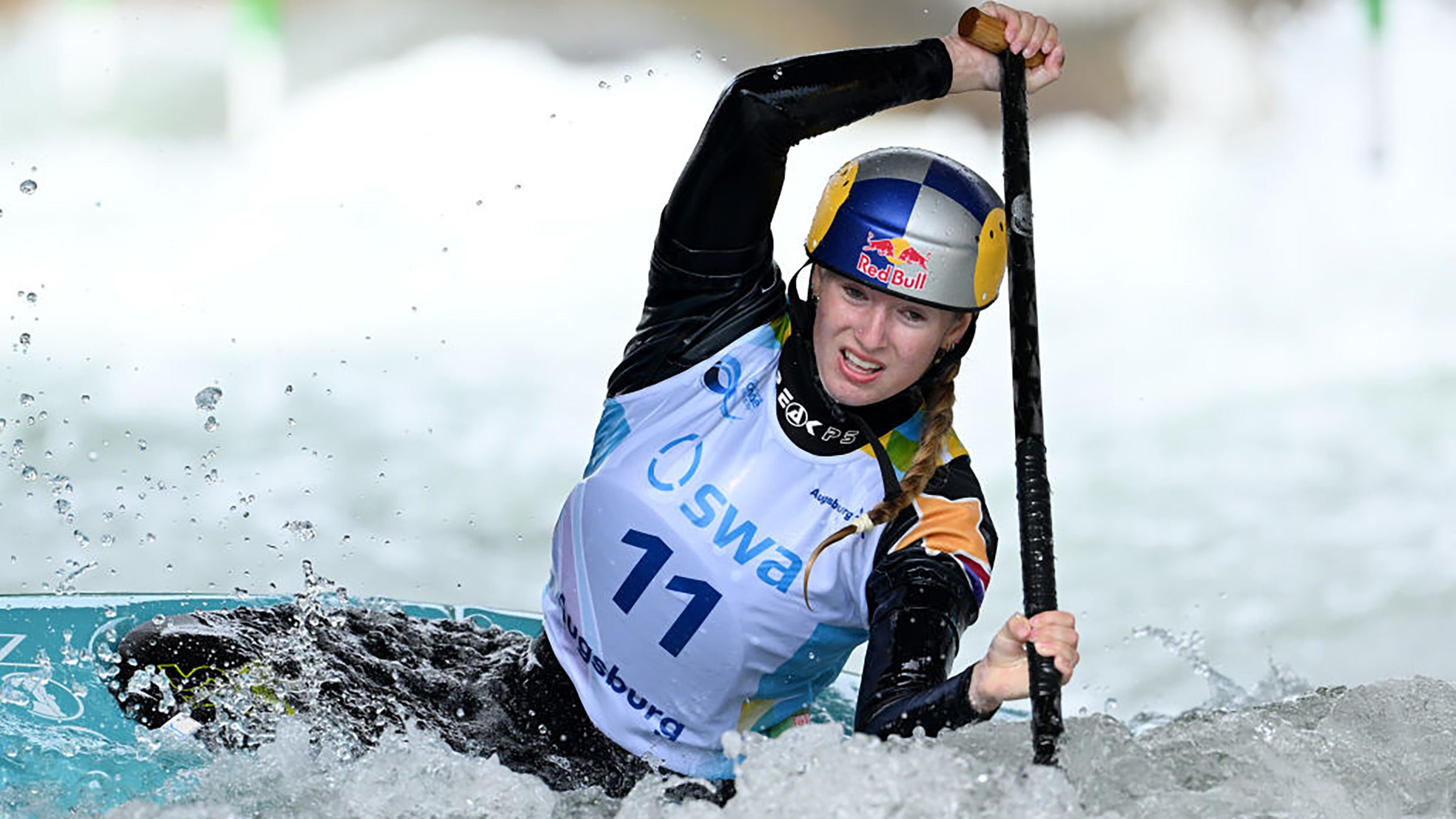Have you ever heard of ? The two-time world champion in canoe sprint won��Olympic gold at 19 in Tokyo. Now 22, Harrison is again a medal favorite in Paris. She’s taken a break from her other job, tending bar near San Diego, to train five hours a day for her 45-second Olympic race.
Does the name Daniela Moroz mean anything to you? She’s the fastest female kiteboarder in the world, and she won her first of six world championships when she was just 15 years old. Now 23, Moroz will be the sole American woman ripping through mistral winds off the coast of Marseille when kiteboarding makes its Olympic debut on August 4.
Familiar with Evy Leibfarth? America’s best female whitewater paddler, who is just 20, is competing in three events in Paris: kayak slalom, KayakCross, and canoe slalom. On Wednesday, July 31, she won bronze in the latter event.
These three American Olympians have the international victories and charisma to attain rock-star status in Hungary or France—nations where sports like kayaking and canoe sprint attain mainstream attention—or in countries with fewer Olympic medalists. Yet in the United States, they are largely invisible—even during the Games. This summer they will join 589 other U.S. athletes at the Paris Olympics. No matter if they win or simply compete, they will likely be overshadowed by heavily-marketed stars on the track, basketball court, and in the pool.
Stars of lesser-known Olympic sports face challenges that mainstream heroes such as swimmers Katie Ledecky and Caleb Dressel do not. In addition to training and competing, they must run their lives like businesses, managing their own costs and logistics for travel. They must constantly seek out sponsorship and financial backing. Many grapple with the psychological burden of asking friends and family for cash, and of winning with little fanfare. This lifestyle comes without a playbook, and managing it requires creativity, hustle, and plenty of luck. Moroz, Leibfarth, and Harrison have offered a rare look at how it’s done.
I Thought It Would Be a Full-Time Job
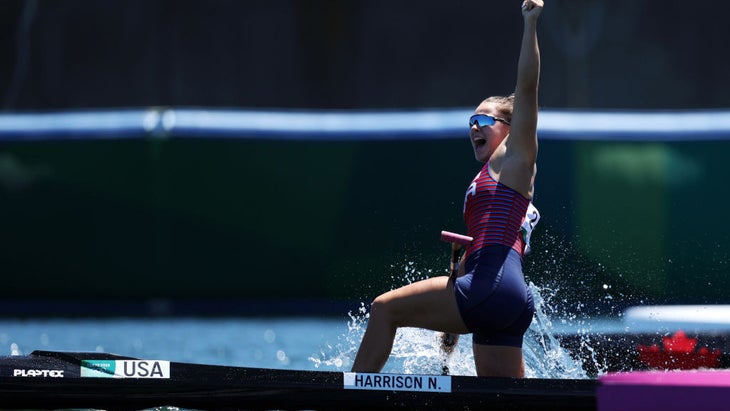
Victory came quickly and unexpectedly for Harrison, a Seattle native. Six years after learning to paddle at summer camp, she shocked herself by winning a world championship in the 200-meter canoe sprint at age 17. “What do I do now?” Harrison told�����ϳԹ��� about the eye-popping result. Two years later, she became the first American ever to win Olympic gold in the discipline.
Canoe sprint has been on the Olympic program for men since 1936, but the International Olympic Committee only added women’s events in 2020. It takes most athletes years to perfect an efficient paddle stroke through the water. With no collegiate pipeline for up-and-coming athletes—and scant funding—the discipline attracts few athletes in the United States.
The discipline requires explosive strength. Harrison kneels in a lunge position in a shallow boat and propels the craft with a single blade across a 200-meter body of water. She takes 90 to 100 strokes per minute, and the boat boat is so narrow and unstable that it feels like she is balancing on a tightrope. In Eastern Europe, the sport is beloved and taught in schools, but not in the United States. Harrison knew that her sport wasn’t popular, but she also assumed an Olympic gold would bring more attention back home.
After Tokyo, Harrison pursued what she called “a real life.” She moved to Southern California, bought a motorcycle, made friends, and pursued a biology degree at San Diego State University. She debated whether or not to continue competing—ultimately decided to stay in the sport. She declined to disclose how much she earned from her sport.
“I was expecting it would be like a paid full-time job if I were to win in Tokyo,” she said. “I thought there would be more financial opportunities.”
She did ink several deals with sponsors Deloitte, Oakley sunglasses, and Plastex boats, and she earns a monthly stipend from the U.S. Olympic and Paralympic Committee. She supplements that with revenue from public speaking and from tending a bar near San Diego. She described her total income as “not super impressive numbers, but together it’s OK.”
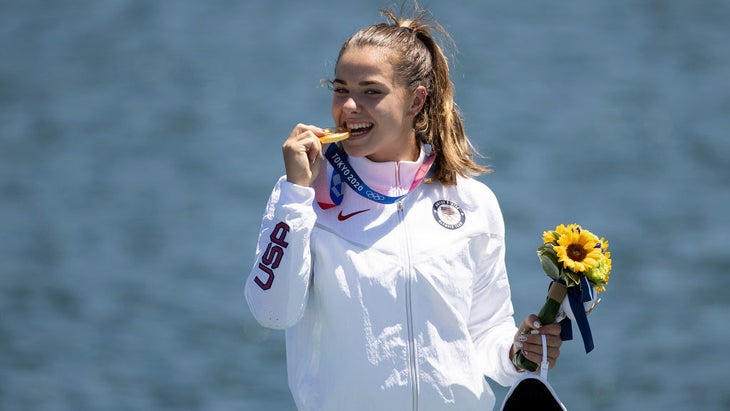
The Paris Olympics could have a major impact on her financial standing. Canoe sprint athletes target just four major international events a year, and sponsors often offer cash incentives at major races like the Olympics and the world championships, which she won again in 2022.
“First versus fourth place determines what apartment I live in next year,” she said. “It’s extra pressure. It’s like: do I pay my bills or not? A medal will mean tens of thousands—if not over $100,000��in direct money you’re going to get versus not get—primarily based on your sponsors and what’s in your contract.”
This summer in Paris, the USOPC will also award $37,500 for each Olympic gold; $22,500 for silver, and $15,000 for bronze. But the difference between placing third and fourth can be 0.3 seconds, as it was at the 2023 world championships, Harrison’s first major loss.
Now that she’s a gold medalist and has experienced competition overseas, Harrison has recalculated her desire for mainstream attention and fame. In Germany or Hungary, for example, she’s mobbed by fans. That’s not the case in California.
“That’s what made me realize I don’t want that level of attention in my life,” she said. “I like the every-four-years you get your time to shine, then you can��go back to being a human being. I have a new level of gratitude for America not caring about my sport.”
CEO of Her Own Show
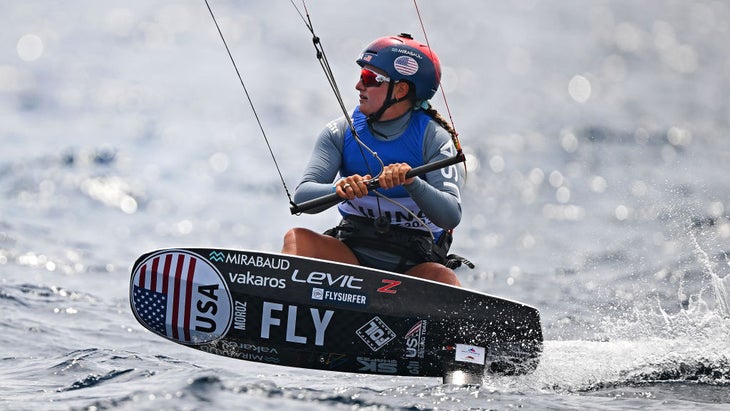
Moroz sometimes hits 45 miles per hour on her kiteboard, which is elevated about three feet off the water on a hydrofoil. She harnesses the power of the wind with a kite, and during a race, she must dodge other competitors and navigate buoys on the course.
When she’s not in the water, Moroz faces different challenges. She must do her own fundraising, and she manages six figures worth of expenses for competition and training. She books her own travel to competition in Spain and Oman, and also to training camps at coastal destinations where the wind is favorable. When she flies from her home in California’s Bay Area to competitions and camps, she must pack and transport a massive array of equipment: 25 kites, three boards, and five hydrofoils.
“I’m essentially the CEO,” she said. “It’s super hard, but you can learn so much.”
She’s been managing this lifestyle since she was 15 years old.
Moroz does have some help. Kiteboarding’s national governing body, U.S. Sailing, pays for her coach. Her family also chips in. During her recent training camp for the Olympics, Moroz’s mother, Linda, who is a judge for the city of Oakland, flew to France and helped cook meals and do grocery shopping for her. The meal preparation was necessary, so that Moroz could gain crucial weight during her preparation period.
But Moroz pays other costs—in 2023 she hired an equipment manager to help her oversee her gear, and she still pays him an annual salary. In 2022 she brought on an agent, who helped her attain a sponsorship with fashion brand Ralph Lauren. To help her stay sharp for kiteboarding’s Olympic debut, she hired a male kiteboarder as her training partner, and paid his travel and living costs in Marseille, where they spent more than a month preparing.
In total, Moroz said the year leading up to Paris cost her about $150,000—triple what she spent in 2021.
“You tend to spend more and more because you’re getting more coaching, more experts, more equipment, or you’re traveling more,” she said.
The international governing body, World Sailing, contributes no funding to top athletes, and the events operated by the governing body do not pay prize money. Instead, Moroz finds other ways to generate steady income. She negotiates performance bonuses in her sponsorship contracts and relies heavily on sailing foundations to help her mitigate expenses through grants or donations. She temporarily operated a GoFundMe donation page, and also sells merchandise on her personal website.
Over the years, Moroz has learned to ask people for money—a skill that she still finds challenging.
“I really struggle with asking donors for money,” Moroz admitted. “It’s so weird. They’re getting nothing in return other than being part of your journey, kind of. It’s super-awkward to be like, ‘Hey, I’m in this Olympic campaign. I need $150,000. You want to give me $20,000?’”
Fundraising of this nature has helped keep Moroz financially stable for several years, but it also nearly sank her career. In 2023, during the qualification process for the Paris Olympics, Moroz began to struggle with burnout. For the first time in her career, she didn’t feel like training.
“When people are giving you hundreds of thousands of dollars of their money to check these boxes, it gets really hard to justify not training,” Moroz said. “If you’re not training, then what are you doing?”
Eventually, she talked to a sports psychologist to figure out when to take a break.
“Even now, I’m not making any money,” she said. “I’m happily breaking even—because any time you’re making money, everything’s just funneling back into the campaign.”
Life-Changing Sponsorship
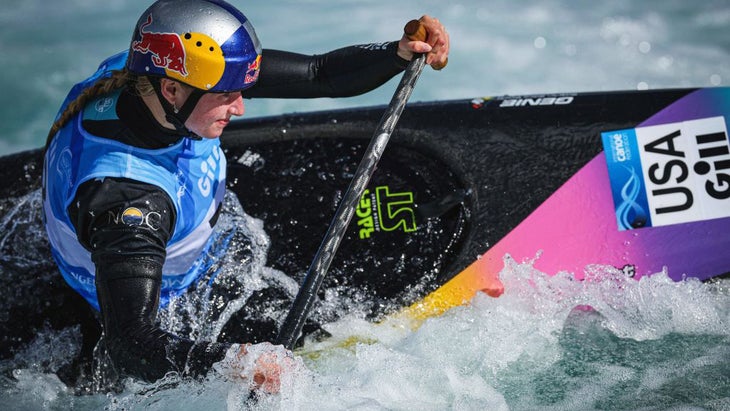
Of the three, Leibfarth seems to be the most financially secure. She turned pro at age 12 and signed a sponsorship deal with Red Bull energy drink at 17, a few months before she competed in the Tokyo Olympics. Leibfarth said brand representatives began speaking with her two years before they made an offer.
The deal has reshaped her position in the sport. Red Bull pays her to endorse the brand, and also gives her access to a sports psychologist and a nutritionist. She’s also made connections with other Red Bull-sponsored athletes, from video gamers to snowboarders. She said a conversation with a Swiss BMX athlete reshaped her attitude toward the Olympics and the increased media attention that comes during the games.
“She told me to say yes to everything,” Leibfarth said.
“It’s the reason I do what I do,” she said.
In addition to training for three disciplines and attending college online, Leibfarth is training to be an emergency medical technician. Fortunately, her Red Bull contract takes care of her expenses—there’s no time to squeeze in another job.
Leibfarth is coached by her father, Lee, and grew up near North Carolina’s famous Nantahala Outdoor Center, a paddling school and guiding company. The facility is now one of her sponsors.
In Paris, Leibfarth will be the first American woman to compete in three whitewater events in the same Olympics. First, she will paddle a kayak through a series of gates on a whitewater slalom course. Days later, she will do the same thing in canoe slalom—using a different boat and a single-bladed paddle to navigate a similar course. And finally, she will race in the newest whitewater event, KayakCross, in which four paddlers race each other down the rapids simultaneously .
It’s an arduous schedule, but competition isn’t Leibfarth’s only focus in Paris.
“There is, of course, so much media,” she says. “I love doing social media. I’ve had Instagram since I was 11. I’m on all platforms, and trying to get into YouTube.”
The Quest for Growth

Leibfarth��hopes to win a medal, and she’s excited by the prospect of bringing more attention to her sport. But she knows that winning won’t overhaul the American kayaking scene.
“I don’t think the sport will explode overnight,” she said. “So many kids don’t know it exists. No matter how I do, all it’s going to take is people seeing it and getting inspired. This is the first step.”
It’s a sentiment echoed by other athletes in other sports that operate outside the mainstream. But this type of exposure alone won’t change their situation.
Harrison, who already has one Olympic gold medal, knows that growth in her sport will require more than victory, attention, exposure, and time. “I’m only one person, one athlete. There’s only so much I can do,” she said. “It’s hard to completely change the game.” But if she does claim gold again, she said, “I’m excited to help people try to get this sport in a better place.”
For Moroz to win her sport’s inaugural gold medal after grinding so hard on the business and athletic side, she would be steeped in gratitude.
“It would mean everything to me,” she said. “But also to so many people who helped and, like, let me stay at their house or let me park my van in their driveway when I was training. I want to do it for them as well.”


